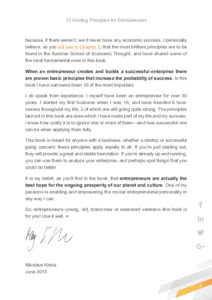Any activity is governed by principles or natural laws. Some are obvious—skydiving, obviously, is governed by gravity. Flying is also subject to gravity, as well as wind and air patterns.
Some are not so obvious. A fantastic example is economics, which for hundreds of years has been subject to “principles” in various schools of thought that actually contradict each other.
When an entrepreneur creates and builds a successful enterprise there are proven basic principles that increase the probability of success. In this book Nikolaus Kimla has narrowed down 10 of the most important.
1. If You Can’t Totally Trust This One Person, You’re Done For
When times get rough, there has got to be someone to fully trust, to fall back on, to pick you up and dust you off. If that person isn’t there, if that person fails you, you’re sunk. That person must be you.
2. 4 Things Entrepreneurs Won’t Ever Learn In School
- Learn all about your field…from your field
- Learn to confront and handle risk
- Learn to cross disciplines.
- Learn social skills
3. Drop That Piccolo and Grab the Conductor’s Baton
A conductor stands before an orchestra, and firmly sets the tempos and moods of the piece being played. The players carefully follow the conductor’s guidance and vision. Like that conductor, an entrepreneur should guide his company, smoothly and skillfully unifying the vision and moving it forward.
4. 6 Lessons Entrepreneurs Can Learn from Mozart
If the music Wolfgang Amadeus Mozart wrote centuries ago is still being played all over the world today, he obviously did something very right. What lessons can we as entrepreneurs learn from such a legendary example?
- Business is a marathon, not a sprint.
- Don’t be an ultra-perfectionist.
- Your actions are everything.
- Find and use your leitmotif.
- Create a spectacular melody and harmony.
- Generously invite participation.
5. Advice for New Entrepreneurs: How Not to Fall on you’re A**
While some may try hard to ignore them, there are hard and fast economic principles that are very much like Newton’s Law of Gravitation. According to Newton, if you jump out of a tree, you will crash to the ground no matter what. Similarly if, in business, you don’t follow certain economic principles, your business is going to fail.
6. Find Your Cathedral
Entrepreneurs can become caught up in the endless activity of creating and running a business. If you’re going to survive, there must be times when you can shut off that stream of thought and examine things more objectively. This process can be called “finding your cathedral.”
7. The Vital Importance of “Why?”
Here’s the difference between the entrepreneur and an ordinary person: The ordinary person encounters an irritating situation in life, kind of gives in and says, “Okay, guess that’s how we have to do things.” The entrepreneur, though, instead asks, “Why do we have to do it that way? Why can’t we do it better?”
8. Entrepreneurs with an Edge: 6 Ways to Build on a Winning Attitude
Many look at a “winning attitude” with cynicism and often make fun of it. You see it made fun of in movies and sitcoms. But if you don’t have in mind that you can win, you’re in the wrong game. Let’s examine a few ways you might reinforce your “winningness” and continue it.
9. Places, Everyone, Places!
A critical part of being an entrepreneur is the solution you bring to market. The naming and development of this solution could be referred to “finding your place.” It is fitting in a missing piece of a puzzle, something that perhaps others now see is missing but didn’t before you came along.
10. Are Entrepreneurs Agents of Happiness Who Could Change the World?
For the first time in history, happiness is more available than ever before—and believe it or not, its primary carrier might be you, the entrepreneur.

































Comments